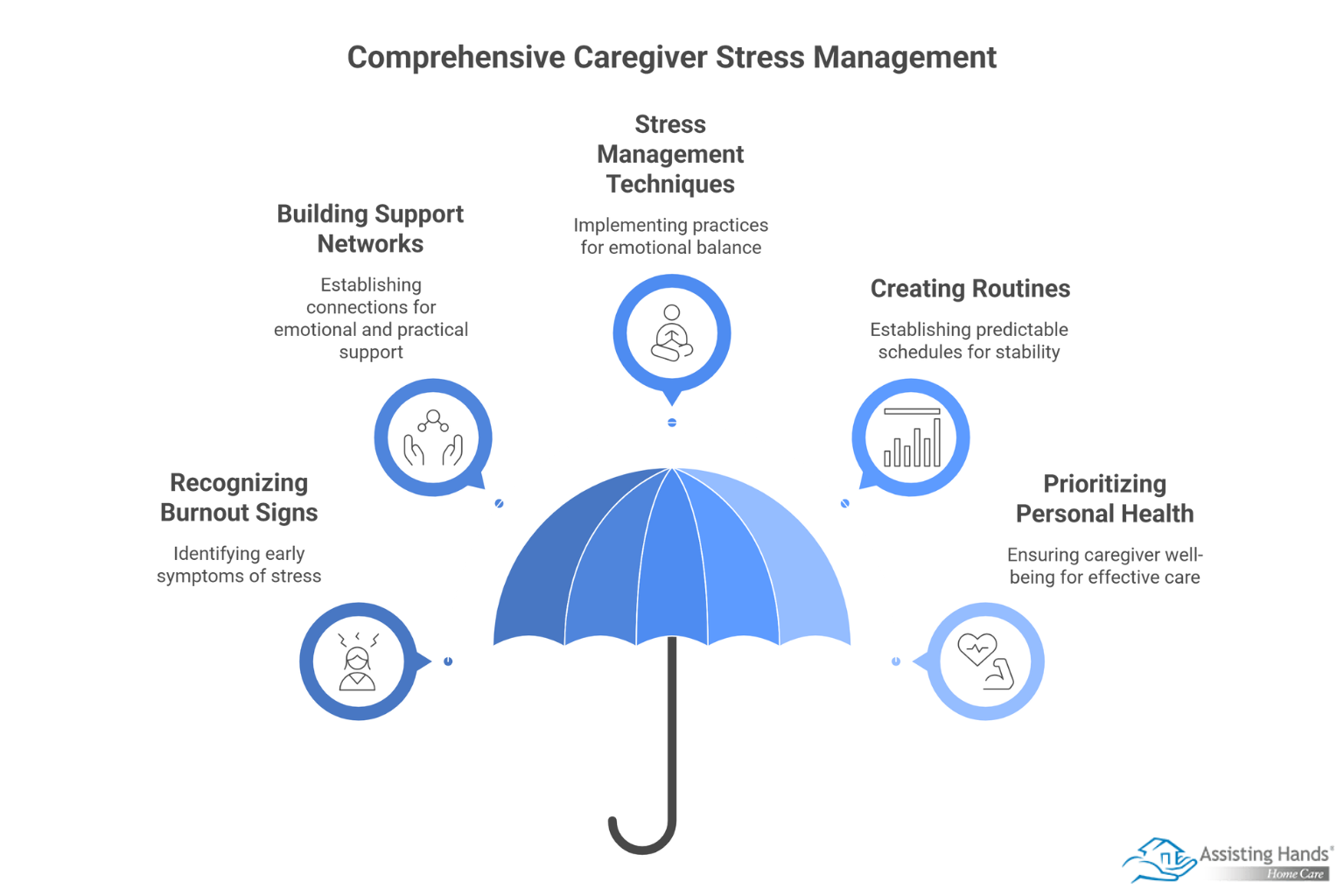
Table of Content
Caring for a senior loved one with dementia presents unique emotional and physical challenges that can overwhelm even the most dedicated family members. The progressive nature of dementia means caregivers must constantly adapt their approaches while managing their own stress and wellbeing. Understanding effective strategies for managing caregiver stress is essential for providing sustainable, high-quality care.
Recognize the Signs of Caregiver Burnout
Caregiver stress often develops gradually, making it difficult to recognize until it becomes overwhelming. Physical symptoms may include chronic fatigue, frequent headaches, changes in sleep patterns, or a weakened immune system. Emotional indicators can be equally challenging and may manifest as:
- Persistent feelings of sadness, anxiety, or irritability
- Loss of interest in activities you once enjoyed
- Difficulty concentrating or making decisions
- Feelings of resentment toward your loved one
- Social withdrawal from friends and family
Recognizing these warning signs early allows you to take proactive steps before burnout becomes severe. Many caregivers dismiss their own needs, believing prioritizing self-care means neglecting their loved ones. However, maintaining personal health is crucial for providing consistent, compassionate care.
Caring for a senior loved one can be overwhelming at times, which puts family caregivers at risk for burnout. One of the most challenging tasks of helping an elderly relative age in place safely and comfortably is researching agencies that provide homecare. Jasper families can turn to Assisting Hands Home Care for reliable, high-quality in-home care for aging adults. We offer 24-hour care for seniors who require extensive assistance, and we also offer respite care for family caregivers who need a break from their caregiving duties.

Build a Strong Support Network
Isolation intensifies caregiver stress, making it essential to establish connections with others who understand the challenges of dementia care. Support networks provide emotional validation, practical advice, and opportunities for respite.
Local support groups offer face-to-face connections with other caregivers experiencing similar challenges. Many communities host regular meetings through hospitals, senior centers, or organizations like the Alzheimer’s Association. Online support groups provide 24/7 access to community and advice, which is particularly valuable for caregivers with limited mobility or time.
Professional support services can also provide crucial assistance:
- Respite care services offer temporary relief for a few hours or days.
- Adult day programs provide structured activities and supervision.
- Home caregivers can assist with personal care tasks.
- Social workers can help you navigate available resources and benefits.
Building relationships with healthcare providers, including primary care physicians, neurologists, and geriatric specialists, ensures access to medical guidance and treatment adjustments as dementia progresses.
If your senior loved one has been diagnosed with a serious condition and needs help with tasks like meal prep, transportation, bathing, and grooming, reach out to Assisting Hands Home Care, a leading provider of senior care families can trust. We also offer comprehensive care for seniors with dementia, Alzheimer’s, and Parkinson’s.
Implement Effective Stress Management Techniques
Regular stress management practices help caregivers maintain emotional balance and physical health. Simple techniques can be integrated into daily routines without requiring significant time or resources.
Deep breathing exercises provide immediate stress relief and can be practiced anywhere. Taking slow, deliberate breaths for just five minutes can reduce anxiety and increase focus. Progressive muscle relaxation involves tensing and releasing different muscle groups, helping you identify and release physical tension.
Physical activity, even in small amounts, significantly impacts stress levels and mood. Short walks, gentle stretching, or dancing to favorite music can provide both physical and emotional benefits. Many caregivers find that exercising with their loved ones when possible creates positive shared experiences while maintaining their own health.
Mindfulness and meditation practices help caregivers stay present rather than becoming overwhelmed by future concerns or past regrets. Apps like Headspace or Calm offer guided meditations specifically designed for caregivers, with sessions ranging from three to twenty minutes.
Create Realistic Daily Routines and Expectations
Establishing predictable routines benefits both caregivers and individuals with dementia by reducing uncertainty and decision fatigue. However, these routines must remain flexible enough to accommodate the unpredictable nature of dementia symptoms.
Morning routines should prioritize essential care tasks while allowing extra time for unexpected challenges. Breaking larger tasks into smaller manageable steps prevents feeling overwhelmed and creates opportunities for success and positive interactions.
Setting realistic expectations involves accepting that some days will be more difficult than others. Perfectionism increases stress and frustration, while focusing on small victories and maintaining safety becomes more sustainable long-term.
Time management strategies help you maximize efficiency while preserving energy for the most important tasks:
- Prepare medications and supplies the night before.
- Keep important phone numbers and information easily accessible.
- Simplify meal planning with easy-to-prepare, nutritious options.
- Batch similar activities together to minimize transitions.
Prioritize Personal Health and Self-Care
Caregiver health directly impacts the quality of care provided to a loved one with dementia. Neglecting personal health creates a cycle where increased stress leads to poorer health, which further reduces the ability to provide effective care.
Regular medical checkups ensure your health issues are identified and addressed promptly. Many caregivers postpone their own medical appointments, but maintaining preventive care prevents minor issues from becoming major health problems.
Adequate sleep is crucial for emotional regulation, decision-making, and physical health. Creating a sleep routine, limiting caffeine in the afternoon, and asking for help with nighttime care when needed all contribute to better rest quality.
Nutrition often worsens when caregivers are stressed and pressed for time. Keeping healthy snacks available, preparing simple meals, and staying hydrated can help you maintain energy levels throughout demanding days. Just as aging in place with personal care assistance allows older adults to maintain independence and emotional security in familiar surroundings, caregivers also benefit from maintaining their own routines and support systems.
Caring for seniors with dementia can be challenging for family caregivers. Luckily, there is dementia care Jasper families can rely on. Professional dementia caregivers help seniors with dementia stay safe and comfortable at home by preventing wandering, providing cognitive stimulation, and assisting with household chores. If your loved one needs professional care, Assisting Hands Home Care is here to help. Call one of our dedicated Care Specialists today to learn about the high quality of our in-home care services.
